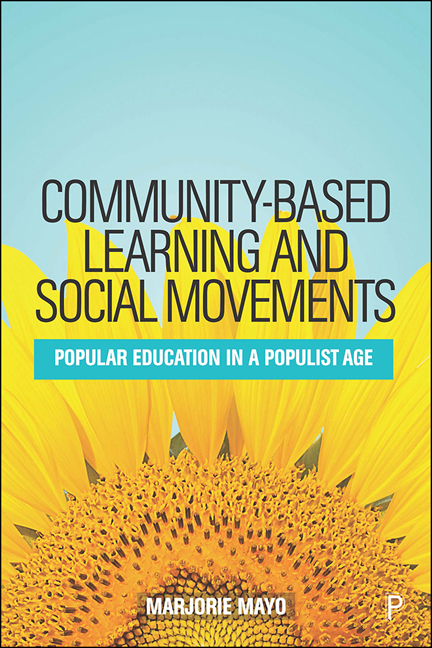Book contents
- Frontmatter
- Dedication
- Contents
- List of Figures
- Acknowledgements
- 1 Popular Education in a Populist Age
- 2 Popular Education and its Roots
- 3 Spaces and Places for Popular Education and Participatory Action Research
- 4 Principles and Practice
- 5 Sharing Understandings of Varying Histories and Cultures
- 6 Making Connections: Linking Issues and Struggles Across Space and Time
- 7 Power and Power Analysis
- 8 Community–University Partnerships
- 9 Taking Emotions into Account
- 10 Looking Backwards, looking Forwards
- References
- Index
9 - Taking Emotions into Account
Published online by Cambridge University Press: 10 March 2021
- Frontmatter
- Dedication
- Contents
- List of Figures
- Acknowledgements
- 1 Popular Education in a Populist Age
- 2 Popular Education and its Roots
- 3 Spaces and Places for Popular Education and Participatory Action Research
- 4 Principles and Practice
- 5 Sharing Understandings of Varying Histories and Cultures
- 6 Making Connections: Linking Issues and Struggles Across Space and Time
- 7 Power and Power Analysis
- 8 Community–University Partnerships
- 9 Taking Emotions into Account
- 10 Looking Backwards, looking Forwards
- References
- Index
Summary
However important as an ingredient in developing strategies for social change, evidence-based research needs to be complemented by popular education approaches that take account of people's emotions. The roots of people's concerns need to be understood and addressed, as previous chapters have already suggested. Popular educators and participatory action researchers have experiences to share in these regards, engaging with people's emotions, including emotions of anxiety, envy, fear and hatred of the ‘other’, as the basis for developing more hopeful strategies for the future.
This chapter starts by summarising ways of understanding the connections between people's emotions and their social contexts. This sets the framework for considering examples of community-based learning strategies to engage with people's feelings and the issues about which they feel passionate. These examples include ‘Hope Not Hate’ workshops, along with ‘Kick It Out’ and ‘Show Racism the Red Card’ initiatives to challenge racism and other forms of discrimination in football, here in the UK. While these specific types of initiative have major contributions to make, the principles that underpin them have wider implications for popular educators too, re-enforcing the importance of engaging with people's passions as well as engaging with their immediate concerns. Whether working through sports or the arts, this is about managing to ‘connect the prose in us with the passion’ as the novelist E.M. Forster expressed this (Forster, 1989: 187) – building relationships of trust as the basis for engaging in transformative dialogues for social change.
Working with emotions
There is an embarrassment of riches when it comes to writings on working with emotions in contemporary contexts. The work of Arlie Hochschild has already been cited in Chapter 1, for example (Hochschild, 2016), exploring feelings of anger and mourning on the American Right. Sara Ahmed's study of the cultural politics of emotions adds insights into the emotions of hate (of ‘the other’) and fear (including the fear of loss) as well as insights into the reverse, emotions of love (for one's family and country, love for the white racial family) (Ahmed, 2015).
- Type
- Chapter
- Information
- Community-based Learning and Social MovementsPopular Education in a Populist Age, pp. 155 - 174Publisher: Bristol University PressPrint publication year: 2020



